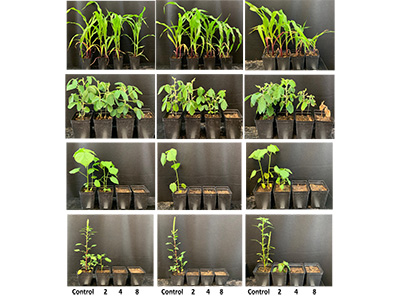The institute works to ensure that efforts to improve water and food security also advance public health and protect ecosystem integrity, drawing on the university’s leadership in regenerative agriculture, natural resources management, water stewardship, water quality analysis, drought mitigation, nutrition and public health. We collaborate with internal and external partners to increase our knowledge regarding the challenge of water quality degradation in Nebraska and elsewhere in the world.
Environmental and human health in agricultural systems
BioWRAP Repurposing chicken feather waste for weed control

Credit: Nebraska Water Center
The BioWRAP (Bioplastics with Regenerative Agricultural Properties) project aims to create spray-on bioplastics from chicken feather waste. These bioplastics are designed to reduce the use of traditional plastics and herbicides in agriculture by protecting soil, controlling weeds and managing water, nutrients, and agrochemicals more effectively. The project is a collaboration led by Kansas State University with researchers from the University of Nebraska–Lincoln (UNL), including Nebraska Water Center Director Chittaranjan Ray and Associate Director Karina Schoengold, and the South Dakota School of Mines.

Credit: Nebraska Water Center
The ultimate product could provide an environmentally friendly alternative to current agricultural practices, with the potential to improve crop yields. Field trials showed that applying BioWRAP in narrow bands between crop rows was as effective at weed control as broader applications while increasing crop yield. Other trials have tested different application rates on soybean plants with varying management practices and the team continues to evaluate the potential commercial market for a BioWRAP product. This technology could significantly enhance sustainable farming practices and contribute to more efficient food production.
Understanding irrigations effects on heat stress and public health
A new study by DWFI Faculty Fellows Liang Chen and Rezaul Mahmood, along with Kristina Kintziger and Jesse Bell from DWFI's Water, Climate and Health team, examined irrigation’s effects on summer heat stress – a combination of temperature and humidity impacting public health – in the U.S. Great Plains. While irrigation can lower air temperature, it also increases humidity, potentially intensifying heat stress in irrigated areas and nearby regions. The researchers found that the impact of irrigation on heat stress varies significantly depending on the specific metric used to measure it.
For example, metrics that highly consider humidity show that irrigation can lead to a substantial increase in humid heat extremes (up to 9°F) and more frequent heatwaves (up to three additional events annually). Conversely, metrics that prioritize temperature more directly suggest that irrigation actually reduces heat intensity, decreasing temperature-based metrics by up to 1.8°F. These discrepancies highlight the urgent need to link these heat metrics directly to actual public health outcomes, which is crucial for developing effective strategies to reduce heat-related risks in rural communities, especially given the vital role of irrigation in agriculture across the U.S. Great Plains.
Investigating Earths critical zone A key to mitigating groundwater contamination
A research team, known as the Critical Zone Research (CZR) Group and led by Nebraska Water Center Research Assistant Professor Arindam Malakar, is conducting investigations into the hydrochemical dynamics of Earth's critical zone. This critical zone encompasses the Earth’s land surface, from the vegetation canopy through the soil and to the depths where fresh groundwater circulates. The group's primary objective is to gain a deeper understanding of the movement of contaminants, such as nitrates, into groundwater resources. Their findings aim to contribute to more effective strategies for mitigating groundwater contamination.
Advancing Public Health Through NASA Partnerships
The Water, Climate, and Health Program (WCHP) is a joint effort between the College of Public Health at the University of Nebraska Medical Center, DWFI, and the Institute of Agriculture and Natural Resources at the University of Nebraska– Lincoln. The initiative pioneers interdisciplinary research, education, and collaborative solutions to public health challenges associated with water and climate in Nebraska and around the world.
In collaboration with NASA, the WCHP is advancing the use of Earth observations to protect public health. In March 2024, the program hosted Harnessing the Heartland: Utilizing Earth Observations for Improved Environmental Health, which brought together public health professionals, researchers, and community leaders to explore how NASA satellite data can guide strategies to improve health outcomes in the U.S. Midwest. As a follow up to this meeting, the University of Iowa hosted the second Harnessing the Heartland workshop in September 2024. In addition, the WCHP’s work on integrating Earth observations into health studies is already producing new insights, including the NASA supported study, Impacts of Drought on Respiratory Mortality in the Upper Midwest United States: A Population Subgroup Assessment. The program will continue to build momentum with a national drought and health workshop planned for late 2025, focused on strengthening preparedness and response to the escalating health impacts of drought across the United States.
Assessing Healthcare Knowledge of Water Quality and Health Impacts
A research study, funded through external support and launched by the Water, Climate, and Health Program, evaluated the knowledge, attitudes, and behaviors of Nebraska healthcare providers and Natural Resources Districts concerning health risks associated with nitrate contamination in drinking water. Although most Nebraskans drink treated water from public water systems, high nitrate levels in drinking water from untreated private wells are linked to serious health issues like methemoglobinemia (blue baby syndrome) and other adverse effects.
In late 2024, more than 600 healthcare providers participated in a survey designed to help the research team identify gaps and opportunities for enhancing healthcare professionals’ roles in mitigating these health risks. The findings will inform targeted outreach and interventions aimed at improving public health outcomes related to water quality.
Environmental and human health
- Groundwater nitrate in Nebraska: key factors and timescales of movement
- Irrigation’s Role in Nutrition: Claudia Ringler Delivers Heuermann Lecture at 2025 Water for Food Global Conference
- Why does groundwater nitrate vary so much across Nebraska?
- U.S. Geological Survey grants support Nebraska-based research projects
- Updates from the Critical Zone Research Group
- Bioplastics with Regenerative Agricultural Properties: BioWRAP
- Wood carbon subsoil amendment for sustainable corn production on sandy irrigated soils
- The Economic Impact of Water Quality on the Environment
- Overcoming Forever Chemicals: Understanding PFAS and the Efforts to Protect Personal and Planetary Health
Top image caption
A beautiful farmhouse in rural Ohio.
Credit: ODesigns | Storyblocks
COOKIE USAGE:
The University of Nebraska System uses cookies to give you the best online experience. By clicking "I Agree" and/or continuing to use this website without adjusting your browser settings, you accept the use of cookies.

